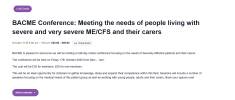Lou B Lou
Senior Member (Voting Rights)
Sally Callow (Stripy Lightbulb) has obtained by a series of FOI the DWP Work Capability Assessment Assessor Training Document for ME/CFS, which was co-created by BACME, which contradicts NICE, which has been used for training DWP assessors since 2023. The training document appears to be a contradictory mash up of NICE Guideline and BACME 'Rehabilitation' and Goal Setting dogma. Signed off by the DWP in May 2023.
Extracts From
' The document promotes an outdated and discredited biopsychosocial view of M.E./C.F.S., contains information that directly contradicts the 2021 NICE guideline (NG206), and encourages assessors to doubt the physical reality of symptoms. This guidance is not only factually incorrect but is actively harmful, risking flawed assessments, unjust denial of support, and causing significant harm to often vulnerable individuals.'
'In our letter to the Secretary of State for Health and Social Care, we stressed that since the clinical standard is set by his department (Health and Social Care) while the flawed training is delivered by the DWP, a cross-departmental solution is essential. We have urged Mr. Streeting to work directly with the Secretary of State for Work and Pensions to ensure this harmful training is immediately withdrawn. We have also shared our findings with the All-Party Parliamentary Group (APPG) for Disability to ensure this issue is raised at the highest levels.'
'Our primary concerns focus on the following dangerous discrepancies:
1. Mischaracterisation of the Illness: The DWP training document promotes a biopsychosocial model of M.E./CFS that has been discredited and rejected by the 2021 NICE guideline. For example, on page 8, the document lists “not attributing the illness to a physical cause” as a “good prognostic feature.” This implies that the illness has psychological drivers, a viewpoint that is not only factually incorrect but also deeply stigmatising. NICE guideline NG206 is unequivocal that M.E./CFS is a complex medical condition. The DWP’s guidance encourages assessors to view patients’ understanding of their physical illness as a barrier to recovery, which is a perilous foundation for an assessment.'

 www.stripylightbulb.com
www.stripylightbulb.com
Extracts from the DWP Training Document (the Bolding is mine).
Overview of Myalgic Encephalomyelitis (or
encephalopathy)/Chronic Fatigue
Syndrome (ME/CFS)
MED-OVCFS~001
10th May 2023
Page 8
Good prognostic features are less fatigue severity at baseline, sense of
control over symptoms and not attributing the illness to a physical cause.
Poor prognostic features are severe fatigue, longer duration of illness,
comorbid anxiety and depression
Page 14:
Rehabilitative therapy
• Cognitive Behavioural Therapy (CBT)
CBT can be beneficial in managing symptoms, improving quality
of life and reducing distress. NICE recommend CBT for people
living with ME/CFS if they want to use it to help manage
symptoms.
Page 15:
BACME therapy
The British Association for CFS/ME suggest a different form of
therapy however there are significant similarities between the
approaches
The aim of therapy is to regulate and desensitise the body by doing
small amounts of activity to achieve a better balance of rest and
activity in daily life.
BAMCE therapy is formed of 4 stages;
engaging, regulating, increasing and sustaining
Page 16
Engaging – forming a therapeutic relationship with the
therapist where the individual feels supported.
Collaboratively setting goals and developing self-
management skills to work towards these goals
Regulating – establishing the baseline and stabilising
routines to balance daily life. Trying to avoid the variation
of ‘boom and crash’ patterns. Establishing routines for
rest, nutrition, activity etc whilst working towards goals.
Aiming for the individual to have a sense of control over
their daily routine so they can aim for improvement
Increasing – allow a gradual increase in level of activity
within the individual’s goals at a realistic pace. Aims to
increase frequency, intensity, quality and/or duration of
activity with a collaborative approach. Consolidating
changes before further increases. Activity is based on
the individual’s goals and their feedback
Sustaining – preparing for the end of therapy and
planning for the future, including relapse planning.
Developing self-management skills to support long-term
goals and reduce the risk of relapse. Aim to continue to
improve quality of life whilst considering daily life
demands
Page 17
Severe/very severe ME/CFS
• A small number of people have severe or very severe ME/CFS which
significantly impacts their lives resulting in them being housebound or
bedbound for long periods of time
Page 18
Likely Functional Effects of Myalgic
Encephalomyelitis (or encephalopathy) / Chronic
Fatigue Syndrome
• For the purposes of Revised WCA, skill is required to assess the
degree to which stated difficulties in persisting with tasks is due to the
physical component of the illness, and which is due to psychological
factors
PS, this document would do well to be in both the BACME and the DWP threads.
Extracts From
'Challenging Harmful and Out-of-Date DWP Training on M.E./C.F.S.'
July 21, 2025 by Sally Callow' The document promotes an outdated and discredited biopsychosocial view of M.E./C.F.S., contains information that directly contradicts the 2021 NICE guideline (NG206), and encourages assessors to doubt the physical reality of symptoms. This guidance is not only factually incorrect but is actively harmful, risking flawed assessments, unjust denial of support, and causing significant harm to often vulnerable individuals.'
'In our letter to the Secretary of State for Health and Social Care, we stressed that since the clinical standard is set by his department (Health and Social Care) while the flawed training is delivered by the DWP, a cross-departmental solution is essential. We have urged Mr. Streeting to work directly with the Secretary of State for Work and Pensions to ensure this harmful training is immediately withdrawn. We have also shared our findings with the All-Party Parliamentary Group (APPG) for Disability to ensure this issue is raised at the highest levels.'
'Our primary concerns focus on the following dangerous discrepancies:
1. Mischaracterisation of the Illness: The DWP training document promotes a biopsychosocial model of M.E./CFS that has been discredited and rejected by the 2021 NICE guideline. For example, on page 8, the document lists “not attributing the illness to a physical cause” as a “good prognostic feature.” This implies that the illness has psychological drivers, a viewpoint that is not only factually incorrect but also deeply stigmatising. NICE guideline NG206 is unequivocal that M.E./CFS is a complex medical condition. The DWP’s guidance encourages assessors to view patients’ understanding of their physical illness as a barrier to recovery, which is a perilous foundation for an assessment.'

Challenging Harmful and Out-of-Date DWP Training on M.E./C.F.S. | Stripy Lightbulb CIC
A series of FOI requests have lead to the discovery of the DWP's training materials for WCA assessors. It's not good.
Extracts from the DWP Training Document (the Bolding is mine).
Overview of Myalgic Encephalomyelitis (or
encephalopathy)/Chronic Fatigue
Syndrome (ME/CFS)
MED-OVCFS~001
10th May 2023
Page 8
Good prognostic features are less fatigue severity at baseline, sense of
control over symptoms and not attributing the illness to a physical cause.
Poor prognostic features are severe fatigue, longer duration of illness,
comorbid anxiety and depression
Page 14:
Rehabilitative therapy
• Cognitive Behavioural Therapy (CBT)
CBT can be beneficial in managing symptoms, improving quality
of life and reducing distress. NICE recommend CBT for people
living with ME/CFS if they want to use it to help manage
symptoms.
Page 15:
BACME therapy
The British Association for CFS/ME suggest a different form of
therapy however there are significant similarities between the
approaches
The aim of therapy is to regulate and desensitise the body by doing
small amounts of activity to achieve a better balance of rest and
activity in daily life.
BAMCE therapy is formed of 4 stages;
engaging, regulating, increasing and sustaining
Page 16
Engaging – forming a therapeutic relationship with the
therapist where the individual feels supported.
Collaboratively setting goals and developing self-
management skills to work towards these goals
Regulating – establishing the baseline and stabilising
routines to balance daily life. Trying to avoid the variation
of ‘boom and crash’ patterns. Establishing routines for
rest, nutrition, activity etc whilst working towards goals.
Aiming for the individual to have a sense of control over
their daily routine so they can aim for improvement
Increasing – allow a gradual increase in level of activity
within the individual’s goals at a realistic pace. Aims to
increase frequency, intensity, quality and/or duration of
activity with a collaborative approach. Consolidating
changes before further increases. Activity is based on
the individual’s goals and their feedback
Sustaining – preparing for the end of therapy and
planning for the future, including relapse planning.
Developing self-management skills to support long-term
goals and reduce the risk of relapse. Aim to continue to
improve quality of life whilst considering daily life
demands
Page 17
Severe/very severe ME/CFS
• A small number of people have severe or very severe ME/CFS which
significantly impacts their lives resulting in them being housebound or
bedbound for long periods of time
Page 18
Likely Functional Effects of Myalgic
Encephalomyelitis (or encephalopathy) / Chronic
Fatigue Syndrome
• For the purposes of Revised WCA, skill is required to assess the
degree to which stated difficulties in persisting with tasks is due to the
physical component of the illness, and which is due to psychological
factors
PS, this document would do well to be in both the BACME and the DWP threads.
Last edited:


